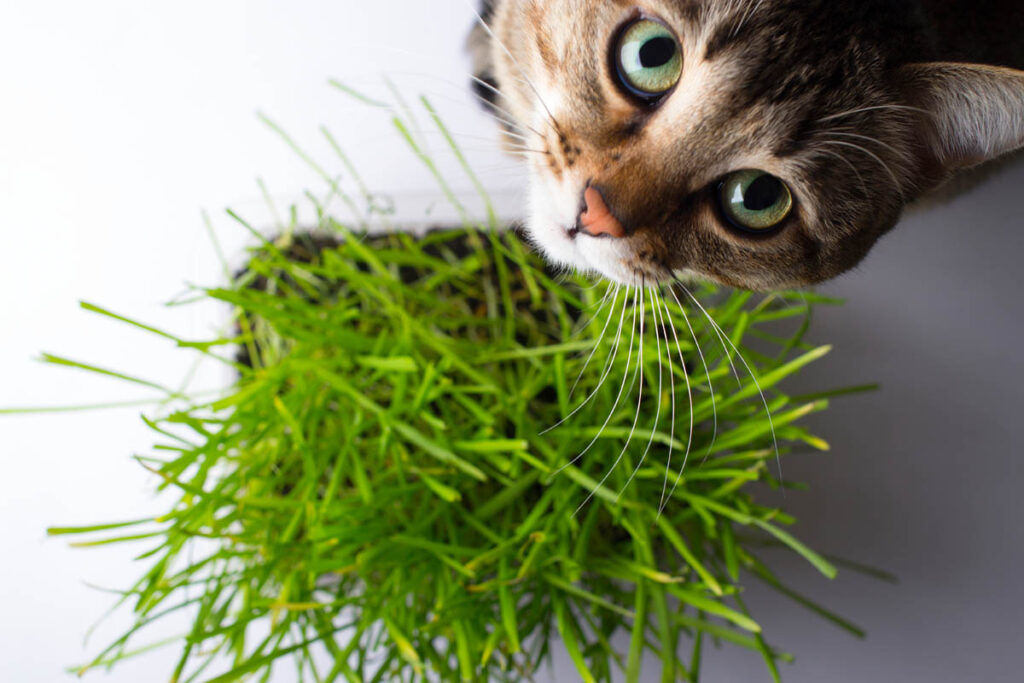There are many ways that herbs can benefit our pets. They are helpful for a multitude of conditions for which drugs are currently employed, including fighting infections, easing pain, assisting organ function, and improving hormone balance, just to name a few. Herbs can even help your animal companion in ways that drugs cannot, such as improving his immune system function, helping him rid his body of toxins, and strengthening his resistance to environmental stress. At the same time, there is a place in a pet’s health care for conventional medications, so be sure to consult your veterinarian for the proper diagnosis and treatment of any disease.
Herbs can often be used in place of drugs and many drugs have been derived from herbs. In fact, the word drug comes from the Middle English word drogge, which means “dried root.” However, while drugs usually consist of a high concentration of a single active ingredient and manipulate the body forcefully in a particular direction, herbs, contain a whole host of ingredients and thereby they can have complex effects on the body. That is why the same herb used for diarrhea might also aid a constipated pet. From my perspective, the active ingredient in the herb is the herb.
A major advantage of herbs over pharmaceutical medications is that herbs cause fewer side effects. This is not to say that herbs never cause problems. The trade-off for gentleness of action is that herbs tend to take time (up to 12 weeks) to have their intended effect on the pet.
Animals naturally practice herbal medicine. Zoopharmacognosy is the study of the process by which animals select and utilize plants, soils, and insects to treat and prevent illness. Observers have noticed that many creatures self-medicate with herbs. Apes have demonstrated a certain herbal sophistication by stripping the leaves of a medicinal plant and then breaking its stem to consume just the juice. Field biologists and others have studied zoopharmacognosy in a wide range of animals, including elephants, gorillas, monkeys, chimpanzees, bison, lambs, pigs, chickens, civets, jackals, tigers, bears, wild dogs, rhinoceros, mole rats, desert gerbils, and even butterflies.
Furthermore, it is possible that we owe our practice of herbal medicine to our friends the animals. Indigenous healers the world over sometimes claim to have determined which plants to use for particular conditions by watching and mimicking the beasts. This assertion is quite likely. So, it is only natural for us to return the favor and utilize herbal remedies for our pets today.
While it may be true that a rose by any other name is still a rose, when dealing with medicinal plants it is imperative that our references be more exacting. Common names for herbs can be very deceiving. First, most of the tens of thousands of plants in the world have no common names. Second, many different herbs share the same common name. For example, cat’s claw is the common name that can refer to two related plants: Uncaria tomentosa and Uncaria guianensis. Although these two plants look similar, they have very different therapeutic actions.
To add to the confusion, a single herb may have many different names. Echinacea (Echinacea angustifolia) is also known as purple coneflower, coneflower, rudbeckia, and black Sampson. This naming situation can lead to quite a bit of uncertainty when selecting an herbal product.
Because of the ineffectiveness of common names, scientific names must be used when discussing herbal remedies. Scientific names refer to plants by their genus and species in Latin. Just as the scientific name for modern-day humans is Homo sapiens and that for domestic dogs is Canis familiaris, so every plant can be specified by its scientific name. This system allows for precise communication regarding herbal prescribing throughout the world.
Generally, herbs are very safe for pets and have many fewer side effects than drugs. The most common problem that any herbal remedy can cause is gastrointestinal upset. If after taking an herb your pet has a loss of appetite, vomiting, or diarrhea, then stop the remedy. When the pet’s system returns to normal, restart the herb at half the dose and gradually work up to the recommended level.
Very rarely, a pet may have an allergic reaction to a specific herb, as can happen with any medication. This will usually manifest with the symptoms of hives, itching, and/or a swollen face. If your pet experiences such a reaction, then discontinue the herb and find an alternative. Severe hypersensitivity reactions may require emergency veterinary care.
Pets can generally take the same herbs that we do with a few exceptions. This is a list of the most common problem herbs.
- Tea tree oil and pennyroyal are very toxic if swallowed by pet. Even when applied topically, it is possible for an animal to become ill if he licks the area.
- Hops are toxic to greyhounds.
- Comfrey can cause liver damage in any pet.
- Garlic contains phytochemicals that can reportedly cause problems with red blood cells, especially in cats.
- Ma Huang is very toxic to cats
- Marijuana can also cause severe problems in dogs and cats.
Please also be aware that herbs can interact with certain medications so consult an expert before giving the two together. Also, certain disease conditions could make a pet more susceptible to herbal side effects. Finally, cats have a different detoxification system than dogs do and are more susceptible to side effects from certain herbs and drugs.
Here are some general dosing guidelines. The amount is to be given 2-3 times daily.
Pet Weight Tea Dried Herb Tincture
0-10 lbs 1/8 c 1/8 tsp 1-3 Drops
10-20 lbs ¼ c ¼-½ tsp 3-5 Drops
20-50 lbs ¼-½ c ½-1 tsp 5-10 Drops
50-100 lbs ½-1 c 1-2 tsp 10-20 Drops
>100 lbs 1 c 2-3 tsp 20-30 Drops
Here are some helpful herbs for pets.
Chamomile (Matricaria recutita)
Chamomile has anti-inflammatory, antispasmotic, antibacterial, and a mild sedative effects. This herb can be used for inflammatory bowel disease, car sickness, and as a digestive aid. It can be sponged onto inflamed skin as a topical application. For a stronger effect you can make a poultice by cooking oatmeal in chamomile tea and apply the mixture to a “hot spot.” You then get the anti-inflammatory benefit of both the chamomile and the oats. Chamomile can cause skin irritation in pets with a ragweed allergy and an excessive dose can irritate the gastrointestinal tract.
Echinacea (Echinacea angustifolia and Echinacea purpurea)
Echinacea can be used to enhance the immune system. Use echinacea to help your pet stave off or overcome any infection. It can be used alone or with antibiotics as the situation dictates. There is no known toxicity to this herb (try to find that phrase in any drug insert) but it should be used with caution in pets with any kind of auto-immune disease. Echinacea products are very commonly adulterated—meaning they are either not pure or plant material other than the desired herb used—so be sure to purchase it from a reputable company.
Ginger (Zingiber officinale)
Ginger can be used as a digestive tonic and antispasmotic. It can be used to ease carsickness, diarrhea, nausea, and coughing. Large overdoses of ginger have been reported to cause depression of the central nervous system and heart arrhythmias. Because ginger reduces the blood’s ability to clot, it should not be used in pets with blood clotting problems, or those with gastrointestinal ulcers, or in conjunction with surgery. Also, ginger has a warming effect on the body and may exacerbate a pet’s fever.
Ginseng (Panax ginseng)
Ginseng is classified as a tonic herb. Sometimes called adaptogens, tonic herbs enhance the overall functioning of the body allowing it to more easily adapt to stress. Ginseng also balances the immune system and is synergistic with cardiac medications. It is extremely rare to see toxicity due to its use but ginseng can possibly cause diarrhea and nervousness. Due to its popularity, it is commonly adulterated.
Licorice (Glycyrrhiza glabra)
Licorice has an anti-inflammatory effect, especially on the lungs and gastrointestinal tract. Licorice appears to reduce inflammation at least in part by prolonging the body’s utilization of its own cortisol, so reach for this herb instead of giving glucocorticoids like prednisone, prednisolone, and dexamethasone. Problems that can be aided with licorice include coughing, dermatitis, gastrointestinal ulcers, inflammatory bowel disease, cancer, infections, and arthritis. Long term use of licorice can cause sodium retention, so this herb should be used with caution in pets with heart, liver, or kidney disease.
Marshmallow Plant (Althaea officinalis)
Marshmallow can be used in place of, and is more ecologically friendly than, Slippery Elm Bark which was commonly recommended in the readings. It helps to enhance immune function, suppress coughing, break up mucous, and moisten mucous membranes so it can be used for bronchitis and respiratory infections. Its normalizing effect on mucous membranes make it ideal for treating gastric ulcers, gastritis, enteritis, and bladder inflammation. Marshmallow can also be used for either diarrhea or constipation.
Cautions: Marshmallow has no known side effects but may delay the absorption of drugs given concurrently.
Milk Thistle (Silybum marianum)
Milk thistle is helpful for any liver issue. It also has antioxidant properties so it can help protect the body from oxidative damage caused by toxins and aging. Milk thistle increases the compound, glutathione, in the liver which helps the body detoxify. There is no known toxicity from milk thistle.
Oregon Grape (Mahonia aquifolium)
In place of the popular herb goldenseal—which should be avoided due to the fact that it has been over-harvested—I recommend the use of Oregon grape. It has anti-inflammatory, antibiotic, and digestive tonic effects. Oregon grape can be used to help a pet fight off any type of infection and can also be used for sluggish digestion. Oregon grape should be used with caution in pets with liver disease.
Saw Palmetto (Serenoa repens)
Saw palmetto can be used to decrease inflammation and to reduce the effects of male hormones. This herb is ideal for dogs with benign prostatic hyperplasia (an enlarged prostate gland). Saw palmetto may also be used to stimulate a pet’s appetite. There is no known toxicity to this herb.



